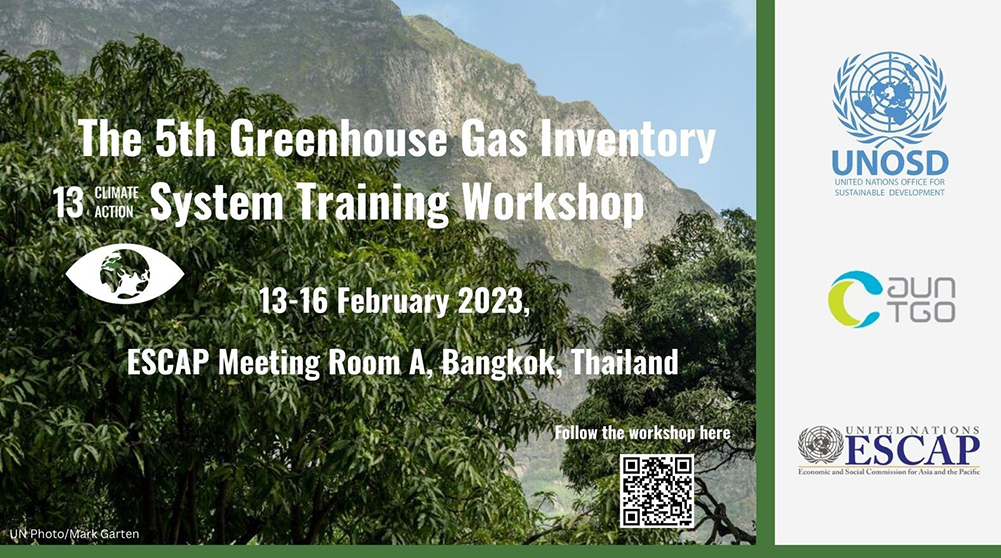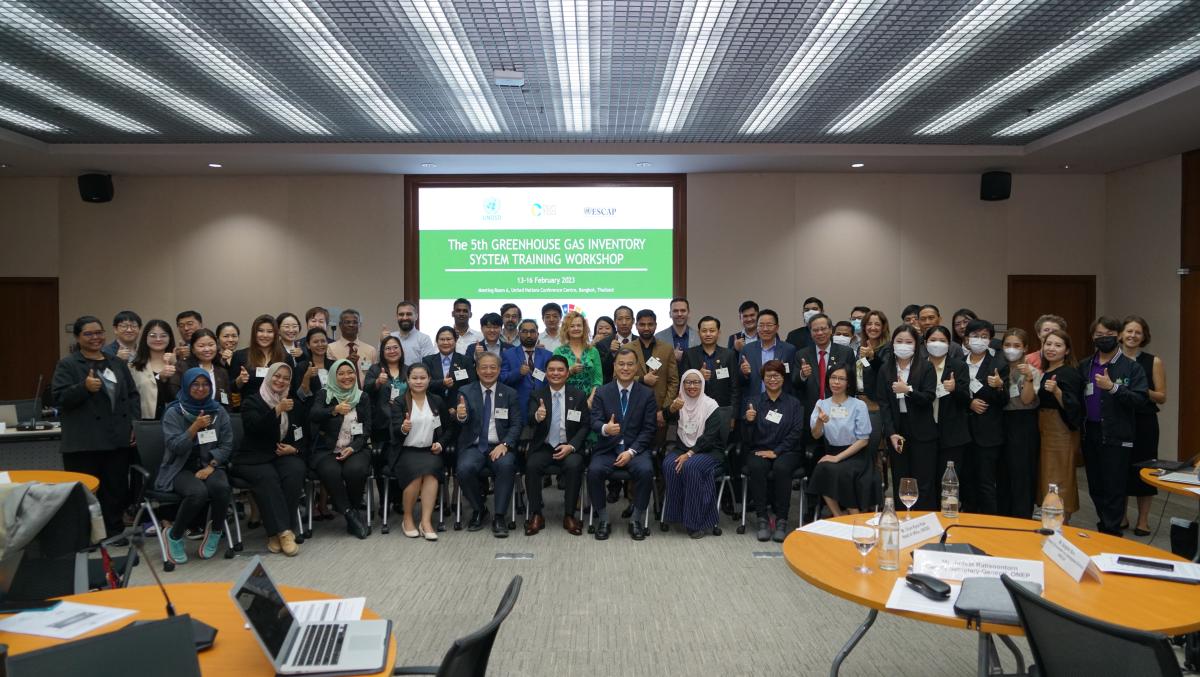[2023] 5th Greenhouse Gas Inventory System Training Workshop

Documents
Concept Note (updated as of 8 February 2023)
Background
The globe is on the verge of climate catastrophe, and the way to avert it is collapsing rapidly. Record-breaking heatwaves, droughts, and floods as a result of climate change are affecting billions of people around the world and getting millions of species at stake. It is clear that we are facing a global crisis that requires urgent action more than ever.
Climate action is more than just one of the 17 Sustainable Development Goals (SDGs) specified in the 2030 Agenda for Sustainable Development. It is a threat multiplier with the potential to worsen some of humanity’s greatest challenges, including health, poverty and hunger. As climate change and Sustainable Development are closely interlinked, achieving SDGs by 2030 heavily relies on addressing the climate crisis.
With an aim to limit global warming to a maximum of 2°C under the Paris Agreement, countries all agreed to report the current status of Greenhouse Gas (GHG) emissions and regularly update the mitigation plans in Nationally Determined Contributions (NDCs). A reliable information inventory should be established first in order to set the target for GHG reduction transparently.
The GHG inventory system plays a major role for countries to measure the current amount of emissions, make projections for future scenarios, and report the achievement of their national objectives. It also provides a better understanding of current climate actions and policies, as well as the level of improvement needed to reach carbon neutrality. National greenhouse gas inventory is the basis of the Enhanced Transparency Framework (ETF) established under the Paris Agreement and is essential for the fulfillment of reporting obligations of the Agreement
While Asia including the Pacific region emits the largest volume of GHG, producing about half the world’s carbon dioxide, they are still having difficulty managing and collecting the GHG-related data. In this context, this year’s workshop is designed to provide an in-person training course including lectures and exercises on GHG Inventory System for government officials and experts from Asia.

Forum Objectives and Contents
The 5th Greenhouse Gas Inventory System Training Workshop aims to provide an opportunity for developing countries from Asia to build capacity and engage in policy dialogue on utilizing national GHG inventories for the design and implementation of NDCs under the Paris Agreement. The workshop is expected to have the following outcomes
- Enhance capacity of government officials and experts on enhancing GHG inventory system by experiencing hands-on actual GHG estimation practice based on 2006 IPCC guideline;
- Exchange of advanced knowledge and experiences of national governments in the Asia region on developing GHG inventory systems;
- Advancing networks among participating organizations, countries, and regions to promote the implementation of the Paris Agreement.
It will consist of formal presentations by international experts, scholars, practitioners, and actors followed by Q&A and discussions. While most of the sessions will take place in plenary, group work and breakout sessions may also be used as needed. A half-day field trip to see different projects illustrating the Korean experience in implementing the 2030 Agenda and its SDGs is foreseen.
The Forum will take place in person.
Target Audience
This workshop aims to engage up to 50 government officials and representatives, national research institutions, and academia particularly from Asian countries, concerned directly with the development and management of national GHG inventory systems. Priorities for participation will be given to the attendees who joined the online workshops held in 2021 and 2022 at least once.
Schedule and Format
The workshop will be held in a hybrid format from 13 to 16 February 2023 in Bangkok, Thailand as some of the speakers will be participating in the workshop online. The entire workshop will be conducted in English
Organizers
This workshop will be organized by the United Nations Office for Sustainable Development (UNOSD), United Nations Economic and Social Commission for Asia and the Pacific (UNESCAP), and Thailand Greenhouse Gas Management Organization (TGO).
Programme and Agenda
Day 1 (13 February 2023)
Opening of the Forum
Moderator: Ms. Chaela Shin, Associate Research and Policy Development Expert, UNOSD
Welcome Remarks:
Outline of the workshop and introduction of participants
- Mr. Chun Kyoo Park, Head of Office, UNOSD
- Mr. Sangmin Nam, Director, Environment and Development Division, UNESCAP
- Mr. Jiravat Ratisoontorn, Deputy-Secretary-General, ONEP
- Mr. Dharma K.C, Director, Climate Advocacy International, Nepal
Main Contents of 2006 IPCC Guideline - Vol. 2 (Energy)
- Ms. Veronika Ginzburg, IGCE (online)
Case Study and GHG Estimation Practice in Energy Sector
- Ms. Veronika Ginzburg, IGCE (online)
Article 6 of the Paris Agreement: A key tool to boost climate ambition
- Mr. Takeshi Miyata, Climate Change Specialist, ADB (Online)
The Role of GHG Inventory System in Accelerating Climate Action
- Ms. Aneta Nikolova, Environment Affairs Officer, EDD, UNESCAP
Day 2 (14 February 2023)
Moderator: Ms. Wonju Kim, Team Assistant, UNOSD
Main Contents of 2006 IPCC Guideline - Vol. 3 (Industrial Processes & Product Use)
- Ms. Heejeong Yim, Director, Erdeliebe Institute
Case Study in Industrial Processes and Produce Use
- Ms. Heejeong Yim, Director, Erdeliebe Institute
GHG Estimation Practice in Industrial Processes and Produce Use
- Ms. Heejeong Yim, Director, Erdeliebe Institute
Main Contents of 2006 IPCC Guideline - Vol. 4 (Agriculture, Forestry, and Other Land Use)
- Ms. Mirella Savatore, Climate Change Officer, Food and Agriculture Organization (FAO)
Experience of Building and Operating Korean National GHG Inventory System
- Mr. Hyung Wook Choi, Director of GHG Inventory Management Team, GHG Inventory & Research Center of Korea (GIR)
Main Contents of 2006 IPCC Guideline Vol. 5 (Waste)
- Mr. Bojan Batinic, Associate Professor, Center of Excellence for Climate and Circular Economy in Novi sad Serbia
Case Study and GHG Estimation Practice in the Waste Sector
- Mr. Bojan Batinic, Associate Professor, Center of Excellence for Climate and Circular Economy in Novi sad Serbia
Day 3 (15 February 2023)
- Mr. Jens Radschinski, UNFCCC/RCC - Bangkok Regional Coordinator on CiACA and ReDICAP activities in Asia-Pacific
- Ms. Aneta Nikolova, Environment Affairs Officer, EDD, ESCAP on CPI modelling tool
Nature- Based Solutions for Urban Design
- Dr. Kotchakorn Voraakhom, Land Process Co., Ltd. Chairwoman of Climate Change WG at International Federation of Landscape Architects (online)
CPI Exercise in Groups: Modelling of CPI to support NDC implementation
- Ms. Aneta Nikolova, Environment Affairs Officer, EDD, UNESCAP
- Dr. Poonperm Vardhanabindu, Climate Modeller and Analyst, UNESCAP
Day 4 (16 February 2023)
Moderator: Ms. Chaela Shin, Associate Research and Policy Development Expert, UNOSD
IPCC Guidance and Supporting tools for preparation for the national GHG Inventory
- Mr. Enoki Takeshi, IGES Fellow/TSU Scientific Advisor, the Institute for Global Environmental Strategies (IGES)
Panel Discussion
Moderator: Ms. Katinka Weinberger, Environment and Policy Development Section, EDD, UNESCAP
- Mr. Chun Kyoo Park, Head of Office, UNOSD and Mr. Sangmin Nam, Director, UNESCAP will be providing comments and interventions to the participants during this panel discussion
Closing of the Forum
Wrap Up
- Ms. Chaela Shin, Associate Research and Policy Development Expert, UNOSD
Closing Remarks
- Mr. Chun Kyoo Park, Head of Office, UNOSD
- Mr. Sangmin Nam, Director, EDD, UNESCAP
- Mr. Chessada Sakulku, Director of Low Carbon city and society office, TGO
Contact Information
For any questions or comments about the forum, please contact Ms. Yujeong Kim, Senior Sustainable Development Officer, UNOSD at yujeong.kim@un.org, Ms. Wonju Kim, Team Assistant UNOSD at wonju.kim@un.org and Ms. Chaela Shin, Associate Research and Policy Development Expert at chae.shin@un.org

